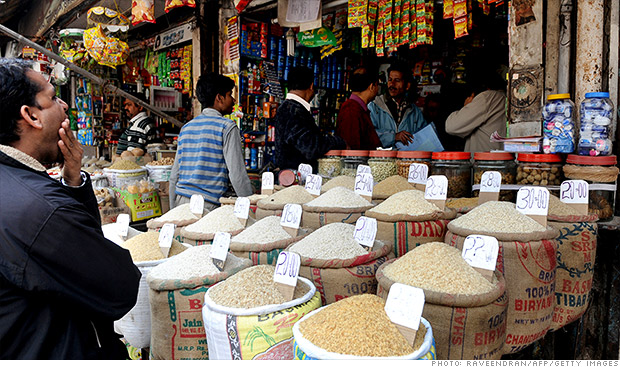
The rupee has dropped sharply versus the U.S. dollar, which means prices could soar in the import-reliant nation.
LONDON (CNNMoney)
Policymakers are working to halt the rapid depreciation of their currencies by raising interest rates and tightening monetary policy. But that may risk slower economic growth in the years ahead and threaten to drag down the global economic recovery.
This week, Indonesia's central bankers held an emergency meeting where they hiked interest rates to stop the sharp fall in the rupiah versus the U.S. dollar.
Central bankers in Brazil and India are also moving to prop up their currencies, with Brazil launching a surprise $60 billion program last week to halt the slide in the real.
These emerging market policymakers have been forced to react to anticipated changes by the Federal Reserve, which may begin cutting back on its bond buying program as soon as next month. Foreign money has drained out of emerging markets and moved back to the United States as investors prepare for an eventual tapering of the Fed's quantitative easing.
Related: Fed warned of global risks to tapering
The fall in emerging market currencies is especially worrying for countries that rely heavily on imported goods. In countries that import food and oil -- often priced in U.S. dollars -- basic necessities will become more expensive for the average person.
There are also fears that borrowers in these countries may not be able to pay back their dollar-denominated loans. Should they default en masse, their domestic banks could suffer. Some of the weaker ones could even fail.
These bleak scenarios are increasingly on the minds of economists and investors, who worry that emerging market economies will be plagued by inflation, high borrowing costs and much slower growth while the U.S. stages an economic recovery.
But other experts say that issues in emerging markets shouldn't destabilize the entire global economy.
"So far it just seems to be an emerging market problem," said Gareth Leather, an economist at Capital Economics in London. "I think the impact on the global economy will be small. But financial markets work in strange ways and there can always be some strange knock-on effects and contagion as we saw with the Asian crisis in 1997 and 1998."
The economics team at Berenberg also said that contagion can't be ruled out, writing in a research note that "there is a real risk of a serious chain reaction" across several big emerging markets. But the economists also said that such a scenario is "unlikely."
"We take some comfort in the fact that most emerging markets look healthier and more mature than five or 10 years ago," wrote Berenberg economists. "For the world economy, the good news from the U.S. far outweighs the collateral damage."
And where does China fall in all of this? The Berenberg economists think China should be okay.
"China is not at risk. It accounts for almost 40% of emerging-market GDP and can use all levers of policy to stay above the fray. Inflation is low, foreign exchange reserves are high and it is not dependent on hot money inflows," said Berenberg.
--CNNMoney's Annalyn Kurtz contributed to this report. ![]()
First Published: August 30, 2013: 4:00 AM ET
Anda sedang membaca artikel tentang
Emerging market woes: Contained or contagion?
Dengan url
http://ngopingeteh.blogspot.com/2013/08/emerging-market-woes-contained-or_30.html
Anda boleh menyebar luaskannya atau mengcopy paste-nya
Emerging market woes: Contained or contagion?
namun jangan lupa untuk meletakkan link
Emerging market woes: Contained or contagion?
sebagai sumbernya
0 komentar:
Posting Komentar